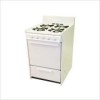Haier HGRA241AAWW User Manual - Page 10
GAS CONNECTIONS All Units, Continued
 |
View all Haier HGRA241AAWW manuals
Add to My Manuals
Save this manual to your list of manuals |
Page 10 highlights
GAS CONNECTIONS (All Units), Continued Have the dealer where you purchase your new range install it or have him recommend a qualified installer. Installation must conform with local codes. in the absence of local codes, the installation must conform with the National Fuel Gas Code, ANSI Z223.1Latest Edition in the U.S.A. or the CAN/CGA B149.1 or .2 Installation Codes in Canada. The range should be connected to the supply line with 1/2-inch black iron pipe or a certified flexible type stove connector. To prevent gas leaks, put an approved sealing compound, which is resistant to liquefied petroleum gases, on all threaded connections. Important: Do not apply pressure directly to the range manifold pipe when tightening supply connections. The manifold pipe should be held securely at the pressure regulator to prevent twisting. Hold the pressure regulator with a wrench during the tightening of the connection, or the manifold pipe may be twisted and split, and cause a dangerous leak. The installation of ranges designed for manufactured (mobile) home installation must conform with the Manufactured Construction and Safety, Title 24 CFR, Part 3280, [formerly the Federal standard for Mobile Home Construction and Safety, Title 24, HUD (Part 280)] in the U.S.A. or C.S.A. Standard CAN/CGA Z240.4.2 in Canada or, when such standards are not applicable with local codes. The installation of ranges designed for recreational vehicle installation must conform with state or other codes or, in the absence of such codes, with the standard for recreational vehicles. ANSI A119.2.2-1982 in the U.S.A. or CAN/CGA Z240.4.2 in Canada. The installation of appliances designed for recreational park trailers must conform with state or other codes or, in the absence of such codes, with the standard for recreational park trailers, ANSI A119.5. Note: Check all piping connections in the unit for leaks. Never use an open flame to check for gas leaks. Use a soap solution. It is not impossible for connections made at the factory to leak, due to vibration encountered in transportation. Make certain you have checked them all, and repair any connections that leak. The appliance and its individual shut-off valve must be disconnected from the gas supply piping system during any pressure testing of that system at test pressures in excess of 1/2 psig. The appliance must be isolated from the gas supply piping system by closing its individual manual shut-off valve during any pressure testing of the gas supply piping system at test pressures equal to or less than 1/2 psig. Electrical Connections All electrical wiring and attachments are 60-cycle, 120 volts, 15 amp max. Your range is grounded with a three-conductor (three-prong plug) supply cord which will ground the range when plugged into a GROUNDED wall receptacle. If the backguard of the range has a clock or light, connect the cord from the backguard into the special terminal block located at the top of the main back directly under the backguard supply cord. The appliance must be electrically grounded when installed in accordance with local codes, or in the absence of local codes, with the National Electrical Code, ANSI/NFPA No. 70 Latest Edition in the U.S.A. or the Canadian Electrical Code, C22.1; Part 1 in Canada, if an external electrical source is utilized. 10















